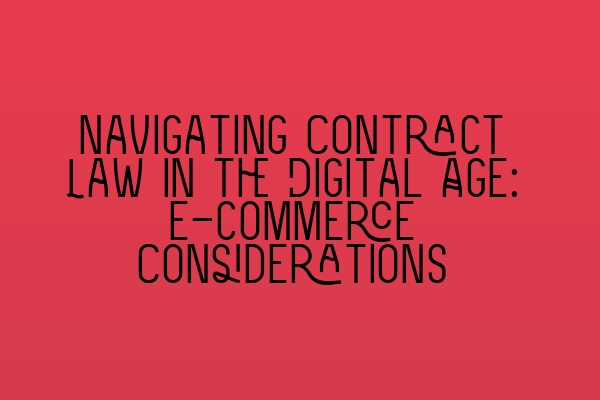Navigating Contract Law in the Digital Age: E-commerce Considerations
In today’s digital age, e-commerce has become an integral part of almost every business. With the ability to buy and sell products and services online, businesses have the potential to reach a global audience and increase their sales exponentially. However, with this new territory comes a myriad of legal considerations that businesses need to navigate to ensure they are protected and compliant with contract law.
As a solicitor specializing in contract law, I understand the complexities and challenges that businesses face when operating in the digital space. In this blog post, I will explore some key considerations and provide insight into how businesses can navigate the world of e-commerce while staying legally compliant.
1. Clear and Enforceable Online Terms and Conditions
One of the most important aspects of e-commerce is having clear and enforceable online terms and conditions. These terms and conditions serve as a contract between the business and its customers, outlining the rights and obligations of each party. It is crucial to ensure that these terms and conditions are well-drafted and cover all relevant aspects, such as payment terms, delivery and shipping policies, returns and refunds, and dispute resolution mechanisms.
2. Validity of Electronic Contracts
With the rise of e-commerce, the validity of electronic contracts has become a significant issue. It is important to understand that electronic contracts are legally binding and enforceable, just like traditional paper contracts. However, certain requirements must be met for an electronic contract to be valid. These include ensuring that the parties involved have the intention to create legal relations, there is an offer and acceptance, and that there is consideration. Businesses should also consider incorporating electronic signature mechanisms to further authenticate the parties’ agreement.
3. Consumer Protection Laws
When engaging in e-commerce, businesses must comply with consumer protection laws. These laws aim to protect consumers from unfair practices and ensure transparency and fairness in transactions. It is essential for businesses to understand their obligations, such as providing accurate product descriptions, offering a cooling-off period for cancellations or returns, and addressing customer complaints and disputes promptly. Failing to comply with these laws can result in legal consequences, including fines and reputational damage.
4. Data Protection and Privacy
In the digital age, data protection and privacy have become significant concerns. Businesses that collect and process personal data must comply with relevant data protection laws, such as the General Data Protection Regulation (GDPR). This includes obtaining consent from individuals for data collection, implementing security measures to protect personal data, and providing individuals with rights to access, correct, and delete their personal information. Non-compliance with these laws can lead to severe penalties, so it is crucial for businesses to ensure they have robust data protection practices in place.
5. Intellectual Property Rights
Intellectual property rights, such as trademarks, copyrights, and patents, are essential assets for businesses operating in the digital space. Protecting these rights is crucial to prevent infringement, unauthorized use, and loss of reputation. Businesses should consider registering their trademarks and copyrights to establish ownership and have enforceable rights. They should also be vigilant in monitoring and taking action against any infringement or misuse of their intellectual property.
6. Online Dispute Resolution
As e-commerce transactions can involve parties from different jurisdictions, resolving disputes can be challenging. Online dispute resolution (ODR) mechanisms, such as mediation and arbitration, provide alternative ways to resolve conflicts efficiently and cost-effectively. By incorporating ODR clauses into their contracts, businesses can mitigate the risk of lengthy and expensive legal proceedings and maintain customer satisfaction.
In conclusion, navigating contract law in the digital age requires businesses to be proactive and well-informed about the legal considerations specific to e-commerce. Clear and enforceable online terms and conditions, valid electronic contracts, compliance with consumer protection laws, data protection and privacy, protection of intellectual property rights, and online dispute resolution mechanisms are some of the key areas that businesses need to focus on. By understanding and addressing these considerations, businesses can operate in the digital space confidently and maximize their success.
To learn more about other legal topics and explore related articles, I encourage you to read the following articles:
– Mentorship for Aspiring Solicitors: Nurturing Talent in the Legal Field
– Legal Challenges and Pitfalls: Navigating the Complexities of the Legal System
– The GDL (Graduate Diploma in Law): A Pathway to Becoming a Solicitor
– Mastering the Solicitor’s Path: Prepare for the Journey Ahead
– The Benefits of Becoming a Solicitor: A Rewarding Career
With the right knowledge and legal guidance, businesses can successfully navigate the complexities of contract law in the digital age and thrive in the realm of e-commerce. As a solicitor specializing in contract law, I am here to provide expert advice and assistance to businesses seeking to ensure their legal compliance and protect their interests.
